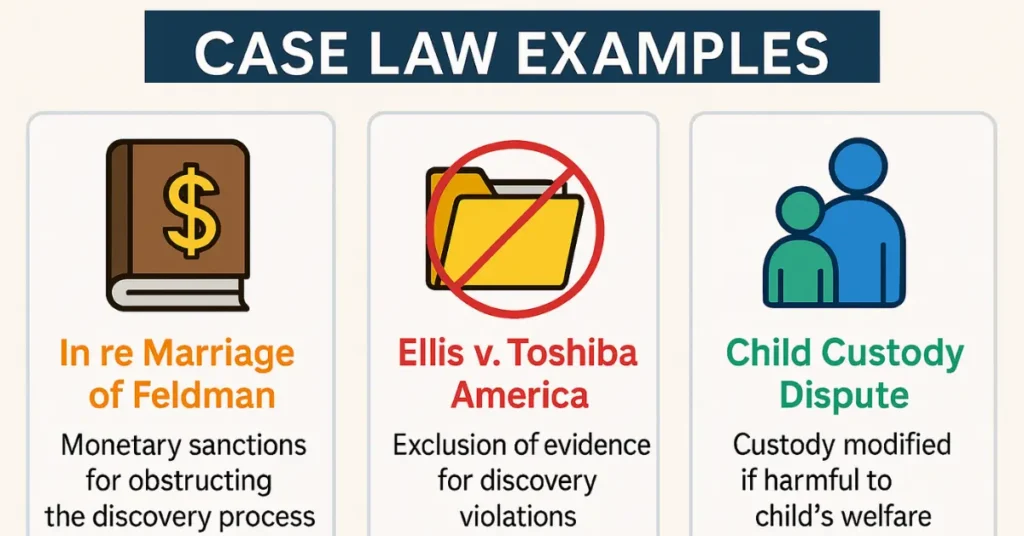Court sanctions play a critical role in ensuring that family law cases proceed smoothly and fairly. These measures, rooted in judicial authority, are designed to enforce compliance with court orders, discourage frivolous litigation, and maintain the integrity of family law proceedings.
By understanding the various aspects of court sanctions, parties in family disputes can better navigate the legal system while avoiding costly penalties.
The term “court sanctions” refers to penalties imposed by a court when a party violates its rules or orders. These penalties can range from monetary fines to more severe consequences like evidence exclusion or even jail time.
In family law cases, sanctions serve as a deterrent to non-compliance and encourage cooperation between disputing parties. Failure to comply with court orders related to custody, visitation, or financial support often leads to sanctions, creating significant legal and personal consequences for the offending party.
Legal Basis for Court Sanctions
California Family Code § 271 is one of the most prominent statutes governing court sanctions in family law. This law aims to promote cooperation between parties and reduce unnecessary litigation.
Under § 271, courts can impose monetary sanctions on a party or attorney to encourage settlement and minimize legal costs. Importantly, the statute emphasizes fairness by ensuring that the imposed penalties are proportionate to the party’s misconduct.
In addition to § 271, the California Code of Civil Procedure §§ 128.5 and 128.7 address frivolous actions or bad-faith litigation. These sections empower courts to penalize parties who engage in baseless or malicious legal tactics, thereby protecting the judicial process.
While § 128.5 focuses on actions lacking merit, § 128.7 targets motions and pleadings filed for improper purposes. Together, these laws create a robust framework for maintaining decorum and fairness in family law proceedings.
Common Grounds for Imposing Sanctions
Sanctions in family law cases arise from various types of misconduct. A frequent reason is the violation of court orders, such as failing to comply with custody arrangements or support obligations.
For instance, a parent who repeatedly ignores visitation schedules may face fines or other penalties. Similarly, bad-faith litigation—where one party files unnecessary or baseless motions—can lead to sanctions aimed at curbing such behavior.
Discovery violations are another common ground for sanctions. This includes withholding, falsifying, or delaying the production of documents during the discovery process. Courts may impose evidentiary sanctions, limiting the offending party’s ability to present evidence, as a consequence of such misconduct.
Furthermore, failure to cooperate in mediation or settlement efforts, particularly when a resolution could benefit all parties involved, often results in penalties designed to encourage meaningful participation.

Types of Sanctions Imposed in Family Law Cases
Family law courts have a range of tools at their disposal to enforce compliance and penalize misconduct. Monetary sanctions are perhaps the most common, requiring the offending party to pay attorney fees or court costs.
California Family Code § 271 frequently serves as the legal basis for these penalties, which are intended to discourage disruptive behavior and promote cooperation.
Evidentiary sanctions prevent a party from introducing certain evidence due to discovery violations, while issue sanctions allow the court to decide specific issues against the offending party.
Contempt of court is another severe consequence, carrying punishments such as fines or imprisonment for disobeying court orders. In some cases, courts may impose alternative remedies, such as community service or additional obligations tailored to the circumstances.
Impact of Sanctions on Family Law Cases
Sanctions can profoundly affect the outcome of family law disputes. In child custody and visitation cases, a party’s misconduct—such as bad-faith litigation or contempt of court—may influence custody determinations.
Courts often view such behavior as indicative of an individual’s inability to prioritize the child’s best interests, leading to adverse custody decisions.
Financially, sanctions can result in increased legal fees and potential instability for the offending party. Monetary penalties not only add to the costs of litigation but also create a long-term burden that can strain resources.
Beyond the immediate financial impact, being sanctioned can damage a party’s reputation and influence future litigation. Judges may view a history of sanctions as a pattern of non-compliance, which can affect credibility and case outcomes.
By understanding the legal framework surrounding court sanctions and their implications, individuals involved in family law disputes can make informed decisions and avoid unnecessary penalties.
Compliance with court orders and genuine efforts to cooperate can significantly reduce the risk of sanctions, ensuring a smoother and fairer legal process.
Prevention: How to Avoid Sanctions
Sanctions in family law cases often arise from a party’s failure to comply with court orders, abuse of litigation procedures, or acting in bad faith. Preventing sanctions requires diligence and adherence to the legal framework.
Compliance with court orders is paramount. These orders may pertain to child custody, visitation rights, or financial support. Any failure to comply with these terms can lead to penalties under California Family Code § 271, which encourages cooperation and discourages litigation that unnecessarily drives up costs.
Engaging in good-faith negotiations is equally important. Courts value efforts to settle disputes amicably through mediation or collaborative negotiations. A party who rejects reasonable settlement offers or refuses to cooperate in mediation risks facing monetary or evidentiary sanctions.
Legal professionals emphasize the need to follow proper legal procedures, especially during discovery. For instance, failure to produce documents, falsifying records, or obstructing discovery can result in discovery violations and severe sanctions.
Working with experienced family law attorneys is crucial. Attorneys help clients navigate the complexities of legal procedures, ensure compliance with court expectations, and avoid inadvertent mistakes that could lead to penalties. By consulting professionals, parties can focus on resolving disputes while minimizing risks of non-compliance.
Steps to Contest Sanctions
If sanctions are imposed, parties have the right to contest them. The first step is filing an appeal under the California Civil Appellate Procedure Rules.
The appeal process allows individuals to challenge the court’s decision, provided they demonstrate errors in the application of the law or procedural issues. Appeals must be filed within the statutory deadline, typically 30-60 days after the ruling.
Demonstrating good cause or mitigating circumstances is another avenue for contesting sanctions. Courts may reconsider penalties if a party can show that their actions were unintentional or influenced by external factors.
For instance, failure to comply with a court order due to a genuine misunderstanding or unforeseen hardship may be grounds for reconsideration.
Lastly, presenting evidence to challenge findings is critical. A party may submit documentation, witness testimony, or expert analysis to support their argument.
In cases involving discovery violations, providing proof of substantial compliance can help reverse sanctions. Legal representation is vital during this process to build a robust defense against the court’s findings.

Case Law Examples
Examining case law offers valuable insights into how sanctions are applied. One prominent example is In re Marriage of Feldman, where monetary sanctions were imposed under Family Code § 271.
In this case, one party failed to disclose significant financial information during the divorce process, leading the court to penalize them for obstructing the discovery process. The ruling highlighted the court’s emphasis on transparency and cooperation in family law cases.
Another illustrative case is Ellis v. Toshiba America, which provides a broader perspective on the implications of evidentiary sanctions.
While not specific to family law, the principles in this case demonstrate how courts penalize parties for failing to adhere to discovery obligations, resulting in the exclusion of critical evidence.
Real-life scenarios further underscore the impact of sanctions. For instance, in child custody disputes, courts may modify custody arrangements if a parent’s actions are deemed harmful to the child’s welfare. These cases emphasize the far-reaching consequences of sanctions and the importance of adhering to court orders.
Resources and Support for Family Law Cases
Navigating family law disputes can be challenging, especially when sanctions are involved. Fortunately, there are many options accessible to help people.
The California Judicial Branch Self-Help Center provides guidance on complying with court orders and understanding legal procedures. This platform offers resources on child custody, support, and other family law issues, making it an invaluable tool for self-represented litigants.
Local bar associations and family law clinics offer free or low-cost legal consultations. These organizations connect individuals with attorneys who can provide tailored advice on avoiding sanctions and addressing ongoing disputes.
For those seeking professional guidance, the American Bar Association (ABA) serves as a reputable resource for ethical litigation practices and case-specific strategies.
If you’re wondering how to apply for a family law attorney appointed by the court, many local resources and clinics can guide you through the process.
Professional organizations also play a vital role in educating litigants about their rights and responsibilities. By leveraging these resources, individuals can better understand the legal framework and reduce the likelihood of sanctions.
Conclusion
Understanding and avoiding sanctions in family law cases is essential for achieving favorable outcomes. Sanctions, whether monetary or evidentiary, can have significant financial, emotional, and legal consequences.
By complying with court orders, engaging in good-faith negotiations, and following legal procedures, parties can minimize risks and foster a cooperative environment.
When sanctions are imposed, it is critical to take swift action, whether through appeals, demonstrating good cause, or presenting new evidence. Learning from case law, such as In re Marriage of Feldman, underscores the importance of transparency and adherence to legal obligations.
Utilizing resources like the California Judicial Branch Self-Help Center and consulting experienced attorneys further ensures compliance and mitigates the risks associated with family law disputes.
Ultimately, fostering cooperation and understanding the legal framework empowers individuals to navigate family law challenges effectively while protecting their rights and interests.




